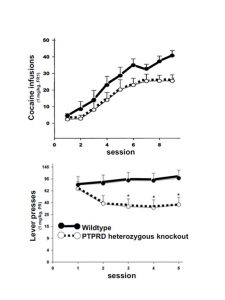
Hot Off the Press – October 25, 2018.
There are currently no effective medications available for the treatment of psychostimulant addiction. Receptor-type protein tyrosine phosphatase D (PTPRD) is a neuronal cell-adhesion molecule that has been associated with psychostimulant addiction in humans. In this research, we found that PTPRD gene mutation significantly reduced vulnerability to cocaine in animal models of addiction and identified a novel compound – a selective PTPRD inhibitor, that appears promising in treatment of cocaine addiction in mice.
Publication Information
Cocaine reward is reduced by decreased expression of receptor-type protein tyrosine phosphatase D (PTPRD) and by a novel PTPRD antagonist. Journal Article
In: Proc Natl Acad Sci U S A, 2018, ISSN: 1091-6490 (Electronic); 0027-8424 (Linking).
